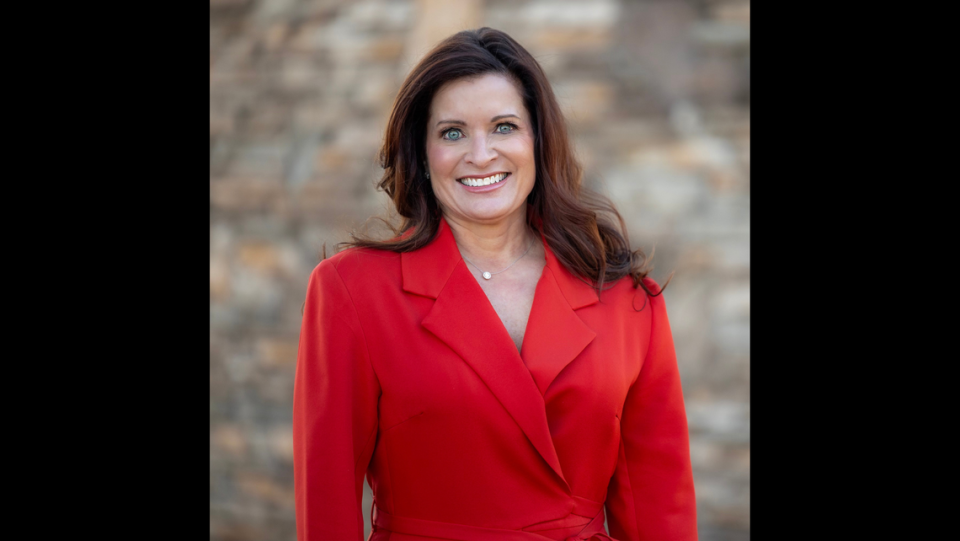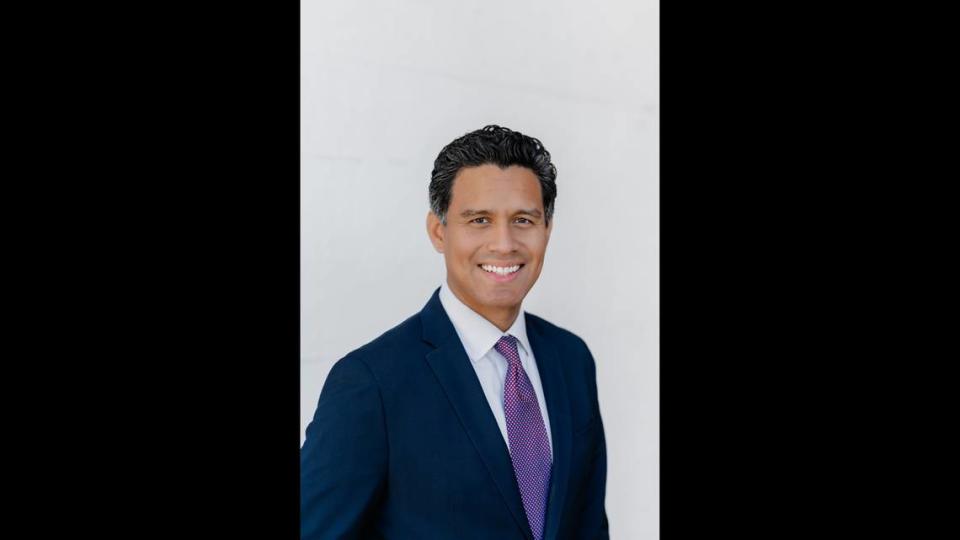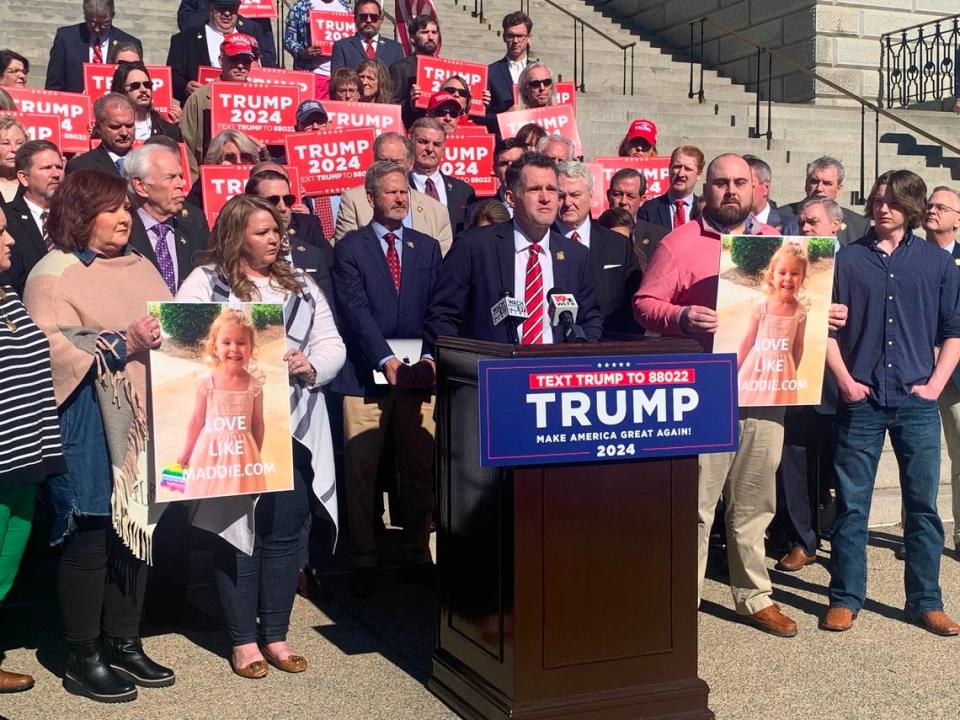GOP candidates in Upstate SC congressional race aim for runoff as they push Trump’s agenda
- Oops!Something went wrong.Please try again later.
- Oops!Something went wrong.Please try again later.
- Oops!Something went wrong.Please try again later.
In the GOP race for the conservative 3rd Congressional District, seven Republican hopefuls are aiming to succeed U.S. Rep. Jeff Duncan.
Because the field is so large, political observers and those in the race don’t expect the nomination to be settled June 11. Instead the race for the GOP nomination is likely to head to a June 25 runoff election. If no candidate receives at least 50% plus 1 of the votes, then the top two candidates move on to a runoff.
With Duncan’s announcement in January he would not seek reelection, seven Republican hopefuls were certified to be on the ballot: Sheri Biggs, Kevin Bishop, Mark Burns, Franky Franco, Phil Healy, state Rep. Stewart Jones and Elspeth Snow Murday.
Four of the candidates are seen as the frontrunners in the race: Biggs, Bishop, Burns and Jones.
Because of the makeup of the district, the winner of the GOP nomination will most likely go on to win the November election and head to Congress next year.
The conservative Upstate district includes all or parts of 11 counties. The district is one of the most conservative in the country, but to be competitive financially means bringing in money from outside the state, or being able to loan yourself cash.
As the leading candidates try to position themselves for an expected runoff, they are invoking the name of another politician who isn’t in the race: former President Donald Trump and showing how supportive they are of the presumptive GOP presidential nominee.
Campaign cash battle
Biggs, who has been a political donor for years, leads the money race, buoyed by a $250,000 loan from herself to her own campaign. She raised $143,000 outside of the loan during the first quarter.
Other candidates are spending their own money in the race. Franco has loaned himself $75,000 of the roughly $101,000 he reported in the first quarter.
Bishop loaned himself $50,000 of the $105,000 he raised. Jones, who also is a state representative, loaned himself $20,000 of the $123,000 he raised, according to Federal Election Commission reports.
Healy raised $5,300 for his campaign, but nearly $3,500 came out of his own pocket. Snow Murday has not filed a campaign finance report.
Burns did not formally file his campaign committee paperwork with the FEC until April 3, allowing him to avoid spending disclosures until the required pre-primary reports due out later in May.
Burns in an interview said he has more than a half-million dollars of his own money into the race for a job that pays $174,000 a year.
This is the third time Burns has run for Congress. The first two times were in 4th Congressional District.
“Don’t spend a whole bunch of money on people,” Burns said about keeping a small staff.
In the last cycle he put $375,000 of his own money and spent almost all of it on staff. He spent only $100,000 on TV and radio ads.
“Clearly it’s not about money. Clearly it’s about you believe in the cause,” he said.
Biggs’ early cash advantage has her advertising on television and radio the most in the district.

Through May 6, Biggs’ campaign has reserved more than $180,000 in cable television and radio spots through June 11. Burns has reserved $91,000 worth of cable airtime. Jones had spent $6,500 on radio time through May 6, according to advertising data obtained by The State.
Jones told The State his campaign planned on buying more airtime and his campaign posted a 30-second video Wednesday talking about his goddaughter Maddie Hines who was killed by a reckless migrant driver allowed to stay in the country by the Biden administration.
Much of the messaging strategy in the race has been on cable advertising on conservative channels, a move that allows campaigns to get a better bang for their buck by targeting ads to certain zip codes. Biggs and Jones also have spent money on local radio, according to ad buy data obtained by The State.
“(Campaigning) is all about the messaging. It’s all about how effectively you can get your messaging out to the voters and then you can get voters to go vote for you. You know, and so that’s, that’s what we’re all trying to do here,” Jones said.
Bishop declined to discuss campaign strategy and ad buys with The State, but Tuesday night released a 30-second video on social media.
Bishop, who previously was U.S. Sen. Lindsey Graham’s spokesman, also has financial support from his old boss. He has received a $3,300 contribution from Graham. Graham-aligned committees have donated $7,000 to Bishop’s campaign, according to FEC data.
Despite the financial assistance from the senator, Bishop insists he’s his own man.
“Lindsey was my boss, and he was an outstanding boss and he’s also a very close personal friend and he will always be my friend. That will not change. But do you agree with every decision your boss makes?” Bishop said. “We each bring our own life experiences to these jobs if you get elected to it. My life experience is much different than Lindsey’s.”
With his small campaign haul, Franco said he’s relying on family, friends and acquaintances from church to spread his campaign message. He does not have paid staff.
“We’re doing it the old-fashioned way,” Franco said.
“I’m not going to be the guy who wins because I raised the money. I’m going to be the guy that wins on the merits of my background and experience and word of mouth spreading,” Franco said.

Runoff expected
With seven candidates on the ballot, and no incumbent running, vote totals most likely will be split, keeping anyone from receiving a majority of the vote on June 11.
“When you’ve got that many candidates running it increases the odds you’re going to have a runoff,” said S.C. GOP Chairman Drew McKissick. “We’ll just have to wait and see. What we do know, once we’ve got a candidate, we’re going to have a unified party to keep the seat come November.”
Biggs, an Air National Guard lieutenant colonel, with her cash advantage is most likely to at least make it to a runoff, leaving Jones, Burns and Bishop battling for the second spot in a runoff, race observers say.
Even though Biggs has been on the air the longest, showing her money advantage, she is preparing for an additional two weeks before the nomination is decided.
“I’m anticipating it could happen, so I’m budgeting, but obviously I’m hoping for the best and I’m running as hard as I can just like it’s tomorrow,” Biggs said. “If it happens it happens. I hope to be in the runoff and I plan to be and if we can do it on June 11, that would be even better.”
Burns said he thinks Biggs, Jones and himself are most likely to make runoff.
“I think everyone there are great conservatives, all do such a good job,” Burns said. “From what I’ve observed … they’re the ones with the most chances to get the word out to the people who do vote.”
Bishop also expects a runoff.
“With a seven-person primary like this with no incumbent, there’s no one who’s going to get 50%,” Bishop said. “I would be shocked. I don’t see that happening at all.”
Franco, who is trailing in the cash race, said he believed the nomination will come down to a runoff.
“I’m doing everything I can to be in the top two,” Franco said.
Attaching themselves to Trump
Most of the top-tier candidates in the race have sought to connect themselves with Trump.
Burns, a Black preacher who has been a Trump surrogate since the 2016 campaign, was endorsed by the former president in the race.
“I’m the Trump lane, but I’m also a strong conservative, because I believe in these strong conservative values,” Burns said.
Anderson County GOP Chairman Jonathon Hill, a former state representative, did not put too much credence in the Trump endorsement.
“Honestly, in my observation, a Trump endorsement doesn’t mean a whole lot, it just means the person who got the endorsement just had the right connections.”
In Trump’s endorsement posted on Truth Social, he said while “there are many great Conservatives exploring a run for that seat,” that Burns was “an America First Fighter, and has my Complete and Total Endorsement — He is a Good Man, a Hard Worker, and will not let you down!”
Leading up to the South Carolina Republican presidential primary, Jones served as a Trump surrogate speaking about the need stronger border control. Jones on the trail shared the story on how his 3-year-old goddaughter who was killed by a reckless driver who previously was deported during the Trump administration but allowed back into the country by the Biden administration.
“We’ve got to secure the border and the ways we need to do that we got to cut off the magnet that is enticing and incentivizing a lot of the illegal activity and illegal aliens to come over,” Jones said.

Jones is trying to show he is the candidate with a proven conservative record. The House Freedom Caucus member can point to his voting record, which includes him successfully attaching a proviso to the 2021-22 state budget which forbade school districts from using state money to enforce a mask mandate.
On his website, Bishop talks about how he helped Graham in the confirmation hearings for three U.S. Supreme Court justices during the Trump administration.
He also touts the need for Trump border policies to be in place.
“(Voters) want someone who can go to Washington and on Day 1 help President Trump regain control of our southern border. I am the only candidate in the race with the background and experience to do just that,” Bishop said in a news release.
Bishop has tried to take portray himself as the non-crazy candidate saying he would have been against ousting former House Speaker Kevin McCarthy and against efforts by Marjorie Taylor Green to oust Speaker Mike Johnson.
“We look like the keystone cops for two months or the gang that couldn’t shoot straight. We look terrible,” Bishop said.
Biggs refers to herself as a “pro-Trump Republican” on her website.
“I can only assume it comes down to that trust factor,” said Jonathon Hill, chairman of the Anderson County Republican Party, and a former state representative. “Usually endorsements are a play for a person’s trust. ‘Vote for me because this other person that you like and trust, and supports me, so hopefully you’re more likely to do so as well.’”
Biggs wants to portray herself as political outsider, but she has donated to Republican candidates in the past and has the endorsement of Gov. Henry McMaster.
She points to her experience as a lieutenant colonel in the air national guard, which she joined while she lived in Mississippi, and as a nurse practitioner who works with mental health.
“I’m ready to work and I want to work with President Trump to tackle issues we’re facing today like immigration, the (economic) problems our families are seeing day to day making ends meet,” Biggs said.
Even though on Franco’s website he mentions Trump three times, the son of Cuban immigrants, says he’s running as his own man.
“I’m running my own race,” said Franco, who’s mother fled communist Cuba in 1964. “I’ve been a conservative Republican my whole life.”
This is Franco’s first time running for office. He went to law school and business school a the University of South Carolina and previously worked for Verizon and Alltel for 16 years.
“It’s a lifetime of preparation to serve in some capacity and this opportunity came up and I’m confident I have the life experience, the background, I’m equipped to be an effective representative for the people of this district,” Franco said.
“He’s the presumptive nominee,” Franco said. “Of course, if I’m getting this position I’m supporting and will be working with President Trump.”

